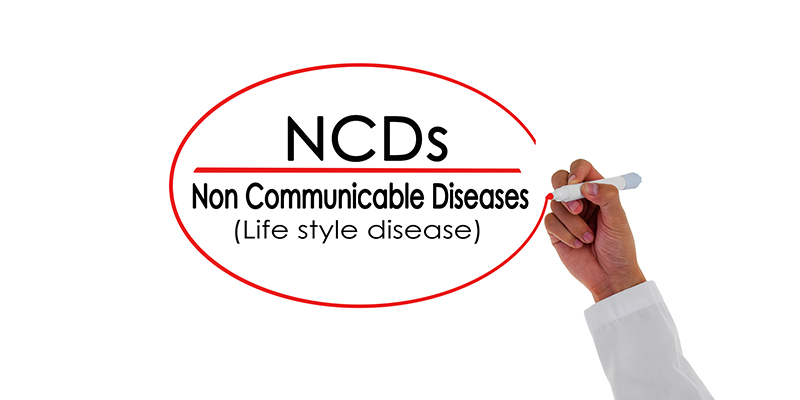
Non-Communicable Diseases in India: The Silent Epidemic
Over the past few years, the burden of non-communicable diseases in India is staggering, both in terms of human suffering and economic costs. According to the World Health Organisation (WHO), NCDs are responsible for a whopping 63% of all fatalities in India. Particularly, heart diseases and hypertension alone contribute to 45% of all these deaths, while respiratory ailments and cancer are responsible for 22% and 12% of the annual mortality rate, respectively.
This alarming rise in the cases of non-communicable diseases underscores the importance of gaining a thorough understanding of the most spread chronic illnesses in India. Read on!
What are Non-Communicable Diseases?
Non-communicable diseases (NCDs) are medical conditions or a group of illnesses that are not directly transmissible from person to person. These typically result from a combination of genetic, physiological and environmental factors, rather than being caused due to infections or external injuries.

Common Non-Communicable Diseases in India
The most common NCDs in India are as follows:
Cardiovascular Diseases
A WHO report highlights cardiovascular diseases, including conditions like coronary artery disease and stroke, as leading causes of death in India, responsible for about 27% of all fatalities. These conditions, often related to lifestyle factors such as hypertension, smoking, and high cholesterol, can be largely preventable through early detection.
Hypertension
Hypertension, often termed the “silent killer,” occurs when the heart works harder than normal to circulate blood, placing extra strain on the heart. In India, more than 1 in 4 individuals suffer from hypertension, with more than 90% of adults with the condition being undiagnosed, untreated, or not effectively controlled. Without timely detection and management, hypertension can lead to critical complications such as heart attacks, strokes, and kidney disease. Monitoring blood pressure is essential to prevent these severe health outcomes.
Cancers
According to a Lancet study, India saw approximately 1.2 million new cancer cases and 930,000 deaths in 2019, making it the country’s second highest cause of disease burden. These alarming statistics are projected to increase by 25% by 2025, highlighting the urgent and deadly threat posed by cancer. Breast, cervical, oral, and lung cancers are particularly prevalent, often linked to lifestyle habits and, in some instances, genetic factors. Early detection presents a crucial chance to curb the rise in cancer cases and potentially save lives.
Diabetes
Marked by persistently high levels of blood sugar, diabetes is witnessing a troubling surge across India. A Lancet study revealed that over 100 million adults had diabetes and ~136 million had prediabetes. The rise in diabetes cases is primarily fueled by sedentary lifestyles and unhealthy dietary patterns, along with genetic factors that make the Indian population more susceptible to the disease.
Chronic Respiratory Diseases
Conditions like Chronic Obstructive Pulmonary Disease (COPD) and asthma, are particularly prevalent in India, exacerbated by air pollution and tobacco smoke, impacting millions across the country. The widespread use of biomass fuel for cooking in poorly ventilated spaces, coupled with the deteriorating air quality in urban centres, serves as a catalyst for respiratory ailments. These conditions not only diminish the quality of life but also pose a significant economic burden due to high healthcare costs in India.
Ways to Prevent NCDs
Preventing non-communicable diseases (NCDs) involves a comprehensive approach that targets the modifiable risk factors associated with these conditions. You already know that eating a healthy diet, maintaining a healthy body weight, avoiding tobacco and alcohol consumption and managing stress are some of the key strategies to reduce the risk of developing diseases.
In addition to this, it is important for individuals to undergo health screenings. Regular health checkups can detect conditions like hypertension, diabetes and cancer at an early stage when they are more treatable. Therefore, it is important for every individual above 18 years of age to get their full body screening done to ensure timely detection and prevention.
India Health Link’s hPod: A Game-Changer in NCDs Prevention
To tackle the NCD crisis, India Health Link (IHL) after an extensive research of years, designed the innovative hPod, a state-of-the-art digital health kiosk aimed at transforming early detection and prevention of chronic diseases.
Equipped to monitor 44 health parameters, both invasive and non-invasive such as body composition analysis (BCA), blood pressure, visceral fat, blood glucose, SpO2, lipid profile etc., the hPod provides a comprehensive health assessment in a user-friendly and easily accessible format. It delivers instant health reports and facilitates real-time consultations with healthcare professionals via teleconsultation, enabling individuals to take charge of their health with informed decisions.
Want to learn more about hPod? Visit the link here or get in touch with us at +91 80474 85152 or write to us at info@indiahealthlink.com
Quick Links
Locations
- India Health Link
- IndiQube Orion, 24th Main Rd, Sector 1, HSR Layout, Bengaluru, Karnataka - 560102.
- +91 80474 85152
- info@indiahealthlink.com

